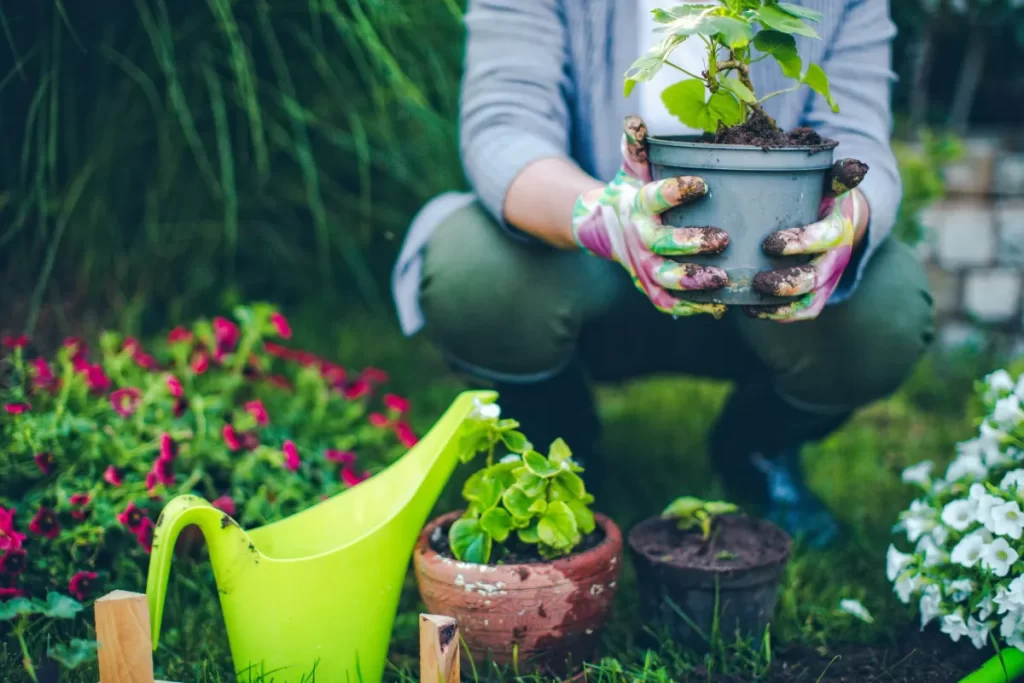Gardening is a wonderful activity. By watering and weeding daily, plants will stay in good condition. Gardening, in this way, requires repetitive routines to do the work.
Planting a garden is a wonderful interaction with friends and family, and if part of a community garden, can be a shared socially enriching experience.
Reduces Stress
These are stress-busting, muscularising exercise that is a great workout for arms and legs because it involves bending, stretching and overreaching, all low-impact activities that don’t cause joint pain. A further benefit of gardening is how it gets people outside with friends – in other words it ticks the social and the exercise boxes! Presences of plants reduce feelings of anxiety, fear and depression to a remarkably significant degree. Looking at a plant lowers blood pressure and heart rates, while gardening or just spending time in a garden raises vitamin D levels. the repetitive movement of garden tasks, such as watering and weeding, can create a relaxing rhythm that calms anxiety, while harvesting can help ease guilt, making it a more pleasurable way to relieve stress. One study found that gardening triggers greater emotional arousal, where people report experiencing more positive feelings than negative ones (for comparison, the researchers also studied readers as a hobby). Earthworms lighten a stressed load and turn serious to a smile!.
Increases Self-Esteem
In an age where screens compete for much of our attention, tending a garden offers the perfect remedy for screen fatigue – and with focus and memory greatly improved. It’s a source of joy to watch plants roll out their leaves, alleviate stress, and reconnect with nature. It’s been shown repeatedly that gardening offers important benefits to self-esteem and mood in vulnerable groups, and an important social channel, which could be particularly useful to those who are perhaps isolated or lonely. Tilling, planting and maintaining a garden is good physical activity, which will release those endorphins that are associated with improved wellbeing. Growing your own food, whether it’s herbs, vegetables or flowers, is associated with improved nutrition, as you get fresh produce free of harmful pesticides.
Improves Attention Span
In fact, research strongly suggests that gardening can boost your ability to focus your attention on a task, as well as improve your mental health. Growing attention: the gardener’s way Regularly paying attention to plants that require frequent pruning, weeding and feeding teaches us to maintain our attention while staying engaged; this, in turn, might alleviate some of those telltale ADHD symptoms. Gardening can also be a form of physical activity. Digging, weeding and raking are all included in the weekly recommended minimum level of moderate-intensity physical activity. As a horticulture specialist with the Texas A M AgriLife Extension Service notes in 2008, ‘For healthy people, being in natural environments reduces stress, anxiety and depression – an effect that researchers believe occurs as humans interact with their environment using more than one sense at a time … For example, by touching soil or drinking water from a spring, smelling a rose or eating a peach, or even just looking at vegetation, people experience the restorative effect of being in a natural setting.’
Reduces Anxiety
Regardless of whether it’s in your own yard or at a community garden, you’ll have an immediate sense of success not only from creating a beautiful feature but also in reducing your level of anxiety and mental stress. In fact, research has found that gardening reduces cortisol more effectively than reading (Williams et al, 2005). To the extent that you can bring this kind of attentiveness to your garden or plant-filled environment, you are practising mindfulness meditation that can help reduce your depression and anxiety. Breathe in the smell of the earth. Listen to the birds. Of course, it’s important that nobody thinks gardening is a substitute for prescribed therapy or medication for mental health conditions, but it can undoubtedly be a wonderful adjunct. If you’d like to try making gardening part of your daily routine, make an appointment with your GP, or visit your nearest open-excavation community garden.
Improves Sleep
Indeed, research consistently suggests that gardening can function as a valuable means of managing chronic stress. As a person provides assistance to a plant in the blooming of its life, and, in so doing, focuses on an object that elicits a sense of calm and enjoyment, a pleasant bond can form between them – one capable of diminishing emotions of anxiety and increasing those of fulfilment. Moreover, the physical activity of gardening encourages the body to prepare for an excellent sleep. cherishing garden, houseplants or both nurtures mindfulness as it anchors you in the activity of now, instead of getting wrapped up in thoughts, fears and worries. A 2020 survey conducted in the midst of the COVID-19 pandemic found that 87 per cent of respondents listed relaxation and stress relief as benefits of gardening, again highlighting that relationship between plant care, stress reduction and sleep.


